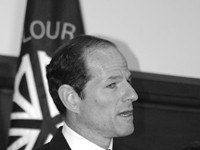New York's Lej: still dysfunctional
Brennan author urges keeping the spotlight on reform
By Krestia DeGeorge[
{
"name": "500x250 Ad",
"insertPoint": "5",
"component": "15667920",
"parentWrapperClass": "",
"requiredCountToDisplay": "1"
}
]
Two years out, it's clear that Jeremy Creelan hasn't lost his passion for this stuff.
From the wonkiest of details to the philosophy underlying it all, the attorney speaks with the urgency of someone immersed in a cause in which he believes deeply. In this case, that passion is directed toward an unlikely concern: legislative procedure.
Creelan made something of a name for himself as the co-author of a 2004 report on the New York State Legislature and its dysfunctionality, published by the Brennan Center at NYU.
But Creelan's interest in the issue of good government began earlier. He first became aware of New York State's unique, sometimes archaic, legislative practices as chair of the Committee on State Affairs for the Association of the Bar of New York. That eventually led him to work on the report that called New York's legislature the nation's most dysfunctional. It cited problematic trappings of each body like the overwhelming control that the Senate and Assembly leaders exert, the moribund committee system, and empty-seat voting. The report earned plenty of media attention and led to some changes, though not as many as it called for.
Since then, Creelan has left the Brennan Center to return to private practice. (Even there, he's partially following his passion: the firm he now works for, Jenner & Block, specializes in government and election law, recently representing the Democratic Party before the US Supreme Court in the controversial Texas redistricting case.) He hasn't left his enthusiasm for state legislature reform behind. He's still speaking out for the changes he originally backed in the report.
"I would just say that the fight is not over," he says. "The public still needs to hold their legislators accountable for not only specific legislation but also for how the government works, how the legislature functions."
What follows is an edited transcript of a recent conversation with Creelan.
City Newspaper: You made specific recommendations about rules changes. How many of them have been adopted?
Jeremy Creelan: Probably the first clear success was eliminating empty-seat voting, requiring legislators to sit in their seats. And that change has, I think, improved the quality of deliberations. In the few instances where it really matters whether people actually debate something on the floor, there's now the expectation that if a bill comes up and there's a controversy about it, people will actually debate it and others will be there to listen to it.
Are there others?
There are two things I'd point to. One was the use of conference committees. Particularly in the budget process, the expectation that there will be a conference committee to reconcile the Senate bill with the Assembly bill to try and come up with a compromise version: that changed. That was something they did in the budget process in 2005 that was a dramatic change, and it was in part a result of our pushing for conference committees to be used more regularly.
Sometimes the changes are just for show in Albany, and other times they're meaningful. But the hope is that if they're used repeatedly over a longer period, they will become part of the expectation of the legislators themselves, and then they will become more meaningful. It's kind of like a muscle that hasn't been used, and as it gets used more it will become stronger and better.
The second thing is committee hearings. I think it's fair to say that the importance of committee hearings was impressed upon the legislature, and both the number and the extent of issues that were addressed by them increased. I don't know if that's temporary or not. Certainly they increased in 2005, and my understanding from talking to legislators is that has produced a better, more deliberative process. So those are the main ones I would point to.
There were a whole bunch of other changes, but the other ones I'm not convinced were that meaningful. In the Assembly, for example, they implemented all these subcommittees to try to give junior members more of a role, more independence in the process, to allow them to pursue their policy goals and interests through subcommittees. I don't see any evidence that that really has made a big difference in the independence of the committees.
What percentage of your recommendations was adopted?
I think it's probably less than 20 percent. Percentage-wise it's a small number; we made 19 or 20 recommendations or something like that.
But I would say the biggest change was just a much greater awareness among the legislators themselves of the public's concern over the legislative process. Before then --- as was evidenced by the leadership's response to the report when it first came out, which I think could be characterized as dismissive --- they did not believe that the public cared at all about how the government worked. They thought the public only cared about specific issues --- bread-and-butter issues like schools, the economy, whatever it may be --- rather than how the government worked.
And they realized that actually voters do care about that. They not only care about it but they know something about it.
That awareness produced a whole set of different outcomes, including the on-time budget.
Why do you think your report resonated with voters, when other reports in the past hadn't?
I think part of it is that it resonated with an existing perception. The public already had an inkling that the government was dysfunctional. This report sort of amplified and gave content to that feeling. If there hadn't been that existing perception out there, I don't think it would've had legs.
And you have to remember: there was sort of a perfect storm. At the time we released it, the legislature had just failed once again to deal with the educational funding issue. This was in July. They did not have a budget. It was just one of the worst summers in recent history for public perception of legislative competence. And so I think it came at the right time.
Of the recommendations that remain to be adopted, which do you think are the most important?
Well, there are a whole bunch and we always view them holistically and say that they need to be viewed that way, because any one particular change would not rock the world. They all really need to be done together in order to make a sea change.
But there are three areas that I would point to that still need a lot of reform. One is the control over the legislative calendar --- basically what gets to the floor for a vote by the full chamber. Other legislatures, both at the state level and in congress, provide the members with a mechanism to overturn the leadership's decisions about whether to bring a bill to the floor or not. The threat of that encourages negotiation to get bills done.
Currently, the speaker and the majority leader exclusively control what gets to the floor, and so you have these decisions about voting that are completely opaque. No one knows why a bill didn't get to the floor, and it's just a brick wall that people face when they try to get legislation through. It shouldn't be that way.
The second area is committees. There still needs to be a lot of emphasis on making the committees independent from the leadership and allowing them to pursue their own path and allowing the chairpersons to pursue their own path. From a policy perspective, it allows each committee to become its own laboratory for policy development.
Part of the outcome you hope for is that if that kind of independence is nurtured, then over time you get better policy. You get more input, you get more initiative, you get more entrepreneurship in the committee chairs and in the committees, and that ultimately produces a better policy outcome.
The other thing is you get more people reading bills. If the committees have more independence, you have more of the sense that it's worth reading a bill, because you know that there's a chance in hell that your bill could actually get to the floor and be considered.
Do we still have the most dysfunctional state legislature in the nation?
Well, our original report did not rank the states. It looked at a number of different indicia to see how New York stacked up. And I think on most of those --- we'd have to update the analysis fully to give you an answer --- but in most of those categories, my sense is that New York has not changed that much. There's definitely been improvement, but I don't think it's that significant.
In his Democratic Party acceptance speech, Eliot Spitzer mentioned redistricting. He said there will be no more lifelong incumbency. What authority does a governor have over legislative redistricting and preventing gerrymandering?
Well, the governor has to sign the bill that determines the districts.
But wouldn't they just override a veto? If Senate Republicans and Assembly Democrats already had their own mutually-beneficial agreement, mustering two-thirds at that point seems like a gimme.
Right. Certainly that's an open question. I think the question is really whether the legislature would override it --- whether the public would tolerate that or not.
So it'd be as much a matter of wielding political capital as the veto?
Right. My own sense is that it'd be hard for the legislature to override a veto on that issue, because it's so self-serving. Then again, nothing really surprises me in Albany, so it's a possibility.
Is there something in the political atmosphere in New York State that is more resistant to change than in other states?
I don't know one way. What I do know is that these problems are longstanding and are very much entrenched. There are many reasons why things stay the same in terms of the legislative process. The leadership control is supported by the redistricting process. It's supported by the campaign-finance laws, because [the leaders] control the housekeeping accounts on a lot of the campaign-finance resources. It's supported by member items, which they use to reward loyal members and punish disloyal members, which makes it hard to change the rules.
And ultimately it is something that it's hard to get the public mobilized about. So there are lots of reasons why things stay the same. That's what was so special about 2004 and 2005 --- that the public really overcame that, to some degree.
Rochester reformers
Bob Volpe still remembers the moment it happened.
The Kodak retiree says he'd always paid attention to New YorkState's government, but he didn't see himself as a reform activist. That changed a few years ago after the state's highest court ruled on a school-aid lawsuit and ordered the legislature to enact a funding formula. But the legislative session came and went with no formula in sight.
"They decided not to decide. And that pressed my button," recalls Volpe. "Coincidentally, that was about the same time the Brennan Center Report came out."
Now, two years later, every seat in the state Senate and Assembly is up for election again, and some of the same people who championed reform in 2004 are trying to put the issue back on the public's radar again.
Volpe, the communications chair for Citizens for Better Government in New York, is among them. His group, which consists of volunteers based in the Rochester area, has teamed up with a coalition that includes similar groups elsewhere in the state, good-government groups like Common Cause and the League of Women Voters, and advocacy groups.
Their task won't be as easy as it was two years ago. This year there are a handful of statewide races, including the one for governor and a Senate race that's getting national scrutiny. Still, Volpe is undeterred. Asked if those higher-profile races would distract voters from local legislative contests and the issues of legislative reform, he responds: "Frankly, we haven't thought about it, but we figure there's some synergism," especially with the gubernatorial race."
Perhaps he's right. Everyone in that race has cast themselves as the best reformer.
Right now, the Democrats control the Assembly and Republicans the Senate. Both parties redraw the district maps to ensure it stays that way. Changing that redistricting process is one of CBGNY's top goals.
"There's an unholy alliance between the Republicans in the Senate and the Democrats in the Assembly," says Volpe. "The legislators pick their voters, not the other way around."
The second major goal for CBGNY is to get each house of the legislature to pass rules changes. This comes straight out of the BrennanCenter's playbook. That report listed 20 or so changes to the rules each body operates under. The changes are designed to make leadership more accountable for what legislation passes and what doesn't and to give rank-and-file legislators more say in the day-to-day business of legislating.
A handful of these changes --- like requiring legislators to be present to vote --- were enacted in 2004 or 2005, when reform was still in vogue in Albany. But a substantial majority were not.
On top of the other obstacles, reform advocates face the problem of energizing an apathetic public around a less-than-exciting issue. Volpe acknowledges that can be difficult. This "convoluted system," as he calls it, helps stymie substantive policy debate and change in state government. Witnessing that stagnation, voters see less incentive to participate, and grow apathetic.
"They don't feel their vote can make any change," says Volpe, so they don't vote, which further entrenches the system. "There's a vicious circle."
This means that connecting the tedious business of legislative procedure to the larger issues facing the state is the task undertaken by groups like CBGNY.
For Volpe and the rest of his group, there are tangible reminders of how the unattended procedural problems have led to stagnation in the state.
"One of our common characteristics in our group is that our kids have left," he says. "We have to get on a plane to see our grandkids."
For more information, check out these sites:
Speaking of New York State Legislature, New York Government
Latest in News
More by Krestia DeGeorge
-

Designers get their turn at downtown
Jan 17, 2007 -

The last wild Finger Lakes
Jan 17, 2007 -

From the new governor: fighting words
Jan 10, 2007 - More »








